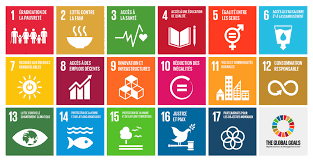HLPF 2017 Briefing Summary
GATJ regional network members, partners and allies including Tax Justice Network, Center for Economic and Social Rights (CESR), Christian Aid, ActionAid, Oxfam, and Instituto de Estudos Socioeconômicos (INESC) among others, gathered in New York to strategize, advocate and amplify voices for stronger commitments to sustainable development, equality, fair fiscal systems and tax justice at the High Level Political Forum (HLPF) conference at the UN headquarters, from 10-19 July.
The HLPF is the central platform for follow-up and review of the 2030 Agenda for Sustainable Development and the Sustainable Development Goals. The conference is open to Member States, with input from civil society organizations (through the major groups and other relevant stakeholders). During the conference, selected countries presented their national voluntary reviews on the implementation of the SDGs in their countries. The theme for this year was “Eradicating poverty and promoting prosperity in a changing world” and the focus set of SDGs included: Goal 1: on poverty; Goal 2: on agriculture; Goal 3. On health; Goal 5: on gender equality; Goal 9: on infrastructure; Goal 14: on oceans; Goal 17: global partnership.
The GATJ global tax and gender working group members were keen to advance the tax justice for women’s rights agenda. This participation was structured through direct bilateral engagements with country delegations, hosting joint side-events focusing on the issues and different country/regional experiences, and the Women´s Major Group, which brought amazing and committed women from nearly from all the continents around the world.
A number of side events were held including a session co-hosted by CESR which highlighted the opportunities, that fiscal policy, open contracting and tax justice hold for gender and economic equality under the Sustainable Development Goals. Voluntary National Review countries made presentations on progress to date and highlighted the key challenges in implementation.
Some of the challenges identified as key systemic obstacles towards the achievement of the sustainable development goals in the presentations included the financing of the SDGs to ensure implementation as well as a proper monitoring and accountability framework. In addition, global policy issues such as harmful tax policies and practices including corporate tax dodging, tax giveaways which promote the race to the bottom phenomenon, illicit financial flows, use of tax havens and secrecy jurisdiction were discussed. However, as noted by CESR “there was no space dedicated for serious analysis of these global policy issues that by definition cannot be dealt with merely at the national or even regional level.” Read more from this CESR blog.
Key highlights of the ministerial declaration
The final draft version of the 2017 Ministerial Declaration for the HLPF also known as outcome document is aimed at accelerating the pace of implementing the 2030 Agenda for Sustainable Development to lift millions out of poverty. Below are some key highlights.
It is notable that the Ministerial Declaration was weak on many fronts, including no mention of tax/fiscal policies. The content of the Declaration on gender equality was subject to debate and watering down (even beyond the content of the SDGs) until late in the Forum. During the closing session, some speakers representing blocs of countries expressed regret at the omission of key issues in the Declaration. Ecuador’s representative, speaking for the “Group of 77” developing countries and China, said it was unfortunate that despite a number of proposals some States had made, there was no mention of harmony with nature and the distribution of wealth. Ecuador has been at the forefront championing the establishment of the UN Global Tax Commission.
Paragraph 1: declares that “They seek to realize the human rights of all” and “The 2030 Agenda is accepted by all countries and is applicable to all, taking into account different national realities, capacities and levels of development and respecting national policies and priorities.”
Paragraph 4: outlines essential systemic elements that challenge the implementation of the 2030 Agenda (including illicit financial and arms flows, inequality, corruption and poor governance). It also crucially highlights women’s role in peace and state building and the right to self-determination.
Paragraph 5: Recognizes that gender equality contributes to the achievement of all other goals.
Paragraph 17: Highlights women’s participation in leadership and managerial position and valuing unpaid care and domestic work with the need for specific actions to achieve gender equality and mainstreaming.
Conclusion
As the High-Level Political Forum came to a close with renewed commitments to take action on the Sustainable Development Goals, GATJ along with our regional networks, partners and allies continue to affirm our commitment to contribute to a reformed international financial architecture and call on world leaders to take the following specific actions i) Develop and implement, with adequate financing, evidence-based national policies and strategies that advance gender equality and women´s rights at the global, regional, and country levels. ii) Mobilize additional resources through progressive tax systems at the country level to fill gaps in domestic investments for girls and women. iii) Reforms within the international financial landscape to address harmful tax policies and practices as well as enhance transparency and accountability.
For more information, contact Caroline Othim
